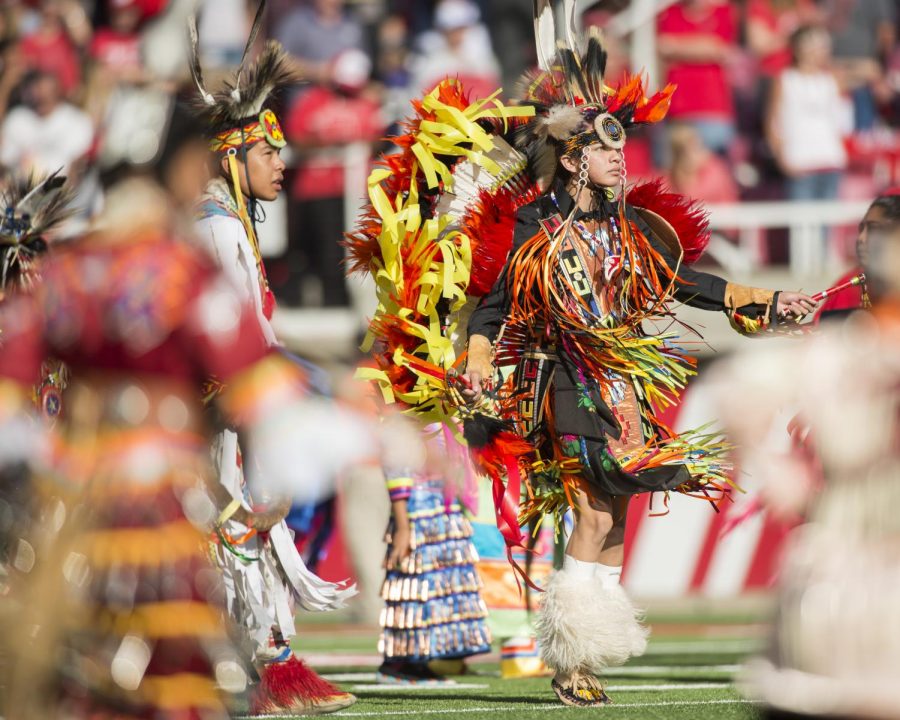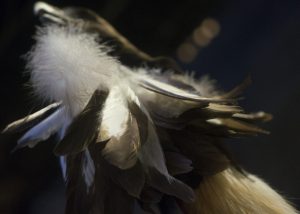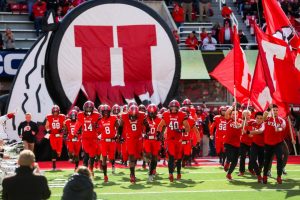Poma: What’s in a Name? More than Institutions May Realize
Members from the Ute Indian tribe performa a ritual dance during the game vs. the Washington Huskies at Rice-Eccles Stadium on Saturday, October 29, 2016. | Chronicle archives
August 12, 2020
Over the past few months, the powerful resurgence of the Black Lives Matter movement has reignited discussions about racism in the United States – including cultural appropriation. Within these discussions, the problematic names of military bases, schools, professional sports teams and mascots have been under scrutiny. We cannot keep these names because of tradition or history. We need to ensure that any name changes that take place are done correctly and respectfully to avoid further disrespecting members of the communities these names affect.
Beyond our own institution, Utah’s own Dixie State University and Brigham Young University continue to honor people who held racist views in theirschool and building names. As with Confederate statues, many people might argue against changing them because names carry history and cultural memory. But that shouldn’t take priority over the well-being of present communities, whose sense of belonging and even safety is undermined by the centering of racist figures or widespread acceptance of cultural appropriation. That’s exactly why BYU’s Black Student Union has urged the school to rename campus buildings whose namesake openly expressed animosity toward Black people.
On the flip side, though, some people – even those from historically oppressed groups – are not as concerned about these problematic names or symbols. The Bountiful High School Braves, for instance, have had white students dress in fake Native American headdresses and paint their faces for events. While some local Native Americans view the use of such a mascot as highly disrespectful and a form of red-face, other indigenous alumni appreciate the fact that non-Native students want to be a part of and take pride in the culture.
Our own school has been criticized for its continued use of “Utes” to refer to its students, athletes and faculty. People defend its usage, pointing to the March 2020 agreement between the University of Utah and the Ute Tribe to renew the rights to the Ute name as evidence of mutual respect and honorable recognition. Some Utes, such as Luke Duncan, have spoken out about non-tribal members needlessly defending the sovereign nation. Duncan believes that the Ute culture on campus sends a positive message of respect for Native American heritage. This perspective adds a new layer to debate over the U’s continued use of the Ute name.
To its credit, the U has taken steps to educate people about the Ute tribe and respect their wishes as much as possible, such as with the Ute Proud initiative on campus. But the years-long debate of the U’s former Native American mascots, plus other instances of indigenous names or mascots being retired, should also be taken into account when choosing to keep a name or not. The pushback against dairy company Land-O-Lakes’ former use of a Native woman, Mia, in its logo is a great example. The positive reaction from members of Native American communities for their decision to change their logo should set a precedent for companies and organizations to make similar decisions.
Even with these nuances in opinion, names such as “Dixie,” “Braves,” and “Utes” still have historical, often derogatory connotations. It doesn’t matter that some might not see the use of these labels as harmful. If we don’t call out the use of these questionable names on our campuses, we open the door for people to justify the racism of historical figures, or uphold problematic behaviors such as the borderline red-facing at Bountiful High. As Connor Richards wrote for the Chronicle in 2016, many of us would be comfortable if we named an athletic team “the Mormons.” If anyone takes offense to a school’s use of a racially charged or culturally significant name, it doesn’t belong on campus.
Renaming a place, or in the U’s case, its entire community, must come from a desire to stop the justification of racism and disrespectful behavior – not as publicity stunts. For instance, the band Lady A (formerly Lady Antebellum) attempted to sue Anita White, a Black woman and long-time blues singer with the stage name “Lady A,” despite changing their name very recently. This type of behavior is insincere, harmful and counterproductive in terms of achieving racial equity and multicultural harmony.
This issue is complicated, but the U specifically should rescind its usage of the Ute name while continuing to celebrate the culture of the Utes on campus. Changing a name might not seem important, but we should always advocate for what is right rather than what is traditional. As someone who is not a member of the Ute Tribe, I recognize it’s not my place to undermine the tribe’s relationship with the U. However, I still believe the name should be retired. I don’t feel comfortable calling myself a Ute when I don’t have that heritage, but I’m happy that our campus embraces Native culture – and that doesn’t have to go away.











Scott Checketts • May 6, 2021 at 4:36 pm
Loved your article. But what about the name Utah itself? It’s derived from theUte language not spoken by the causasians then and not many now.
Should we change the state name now?😂